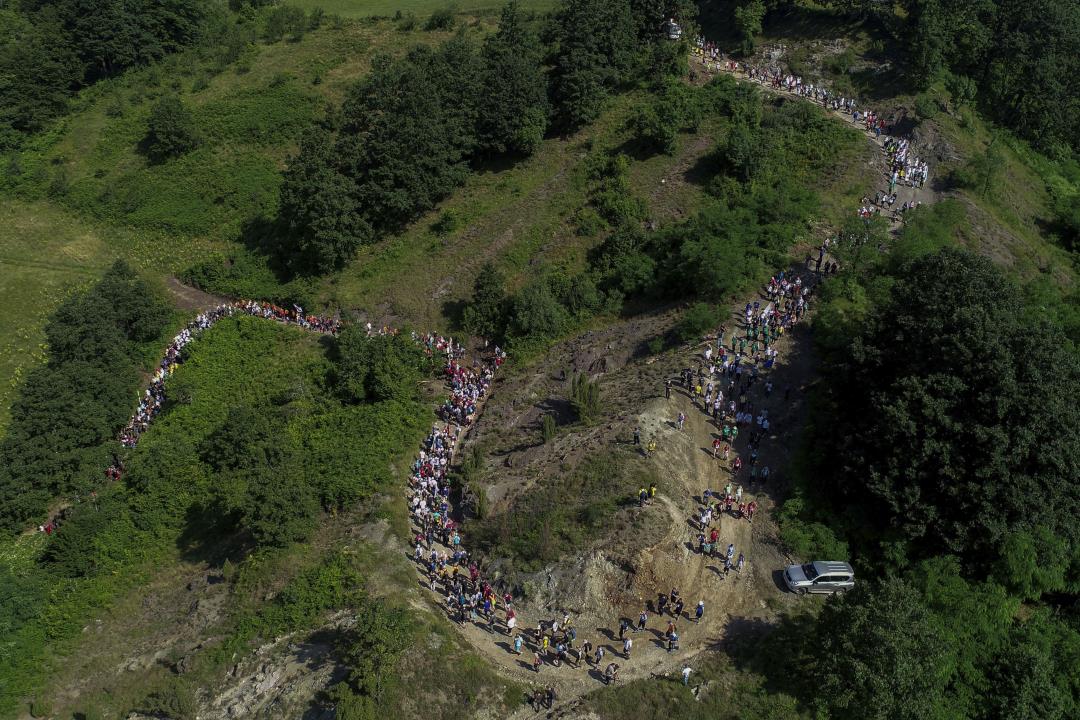
A solemn peace march commenced on Saturday, weaving through the forests in eastern Bosnia. This march serves as a poignant reminder of the 1995 Srebrenica massacre, which stands as Europe’s only recognized genocide since World War II. In an attempt to escape the clutches of Bosnian Serb forces during the 1992-1995 war, thousands of Bosniak men and boys, predominantly of Muslim descent, were mercilessly slain. Covering a distance of 60 miles, the march retraces the path taken by these victims. Its inception precedes a series of events that culminate on the actual anniversary of the massacre, July 11.
Nearly 4,000 individuals participated in this year’s march, as confirmed by the organizers. Concurrently, ethnic tensions continue to pervade the region, as Bosnian Serbs persistently advocate for greater autonomy and openly call for separation. Speaking about his participation, Resid Dervisevic, who joined the march in 1995, remarked, “I come here to honor the memory of my brother, friends, and war comrades who perished here. It is our moral duty to partake in this march and safeguard our memories.” Another survivor of the Srebrenica massacre, Osman Salkic, expressed mixed emotions, stating, “Feelings are complex when you visit this place, knowing that people lay deceased here in 1995, and witnessing the current situation.”
The Bosnian war erupted in 1992 following the dissolution of Yugoslavia, with Bosnian Serbs rebelling and seizing land to establish their own state and join Serbia. Before the war ended in 1995 through a peace agreement brokered by the United States, over 100,000 lives were lost. During July 1995, Serb troops separated more than 8,000 Bosniak males from their wives, mothers, and sisters, relentlessly hunted them in the woods surrounding Srebrenica, and executed them. In an attempt to conceal the evidence of this heinous crime, the bodies were discarded in mass graves around the eastern town. Prior to Russia’s invasion of Ukraine, the atrocities in Bosnia were widely regarded as the worst in Europe since World War II, according to the AP.
Fears persist that Milorad Dodik, the pro-Russian Bosnian Serb leader pushing for separatism, may exacerbate instability in the region amidst the ongoing conflict in Ukraine. Despite rulings from two UN courts confirming the genocide in Srebrenica, Dodik denies its occurrence, even as new victims are discovered and reburied each year on July 11. Both Radovan Karadzic, the wartime Bosnian Serb political leader, and Ratko Mladic, the former military commander, received life sentences from the UN war crimes court in The Hague for orchestrating the genocide. Thus far, more than 6,600 individuals have been unearthed and laid to rest at a vast memorial cemetery outside Srebrenica. On Tuesday, the remains of 30 additional victims will be interred there.
(Read more Srebrenica massacre stories.)
Denial of responsibility! VigourTimes is an automatic aggregator of Global media. In each content, the hyperlink to the primary source is specified. All trademarks belong to their rightful owners, and all materials to their authors. For any complaint, please reach us at – [email protected]. We will take necessary action within 24 hours.


